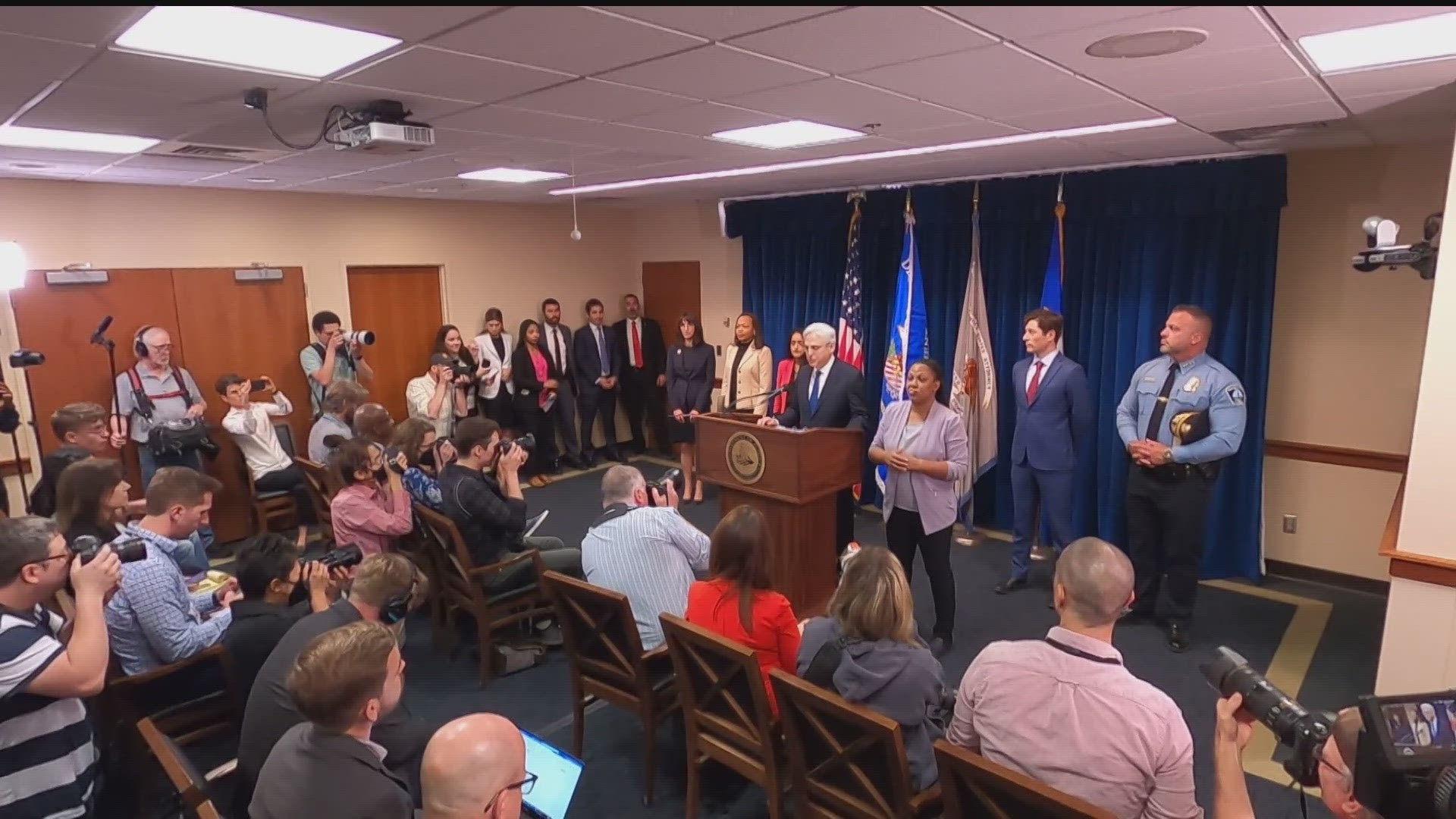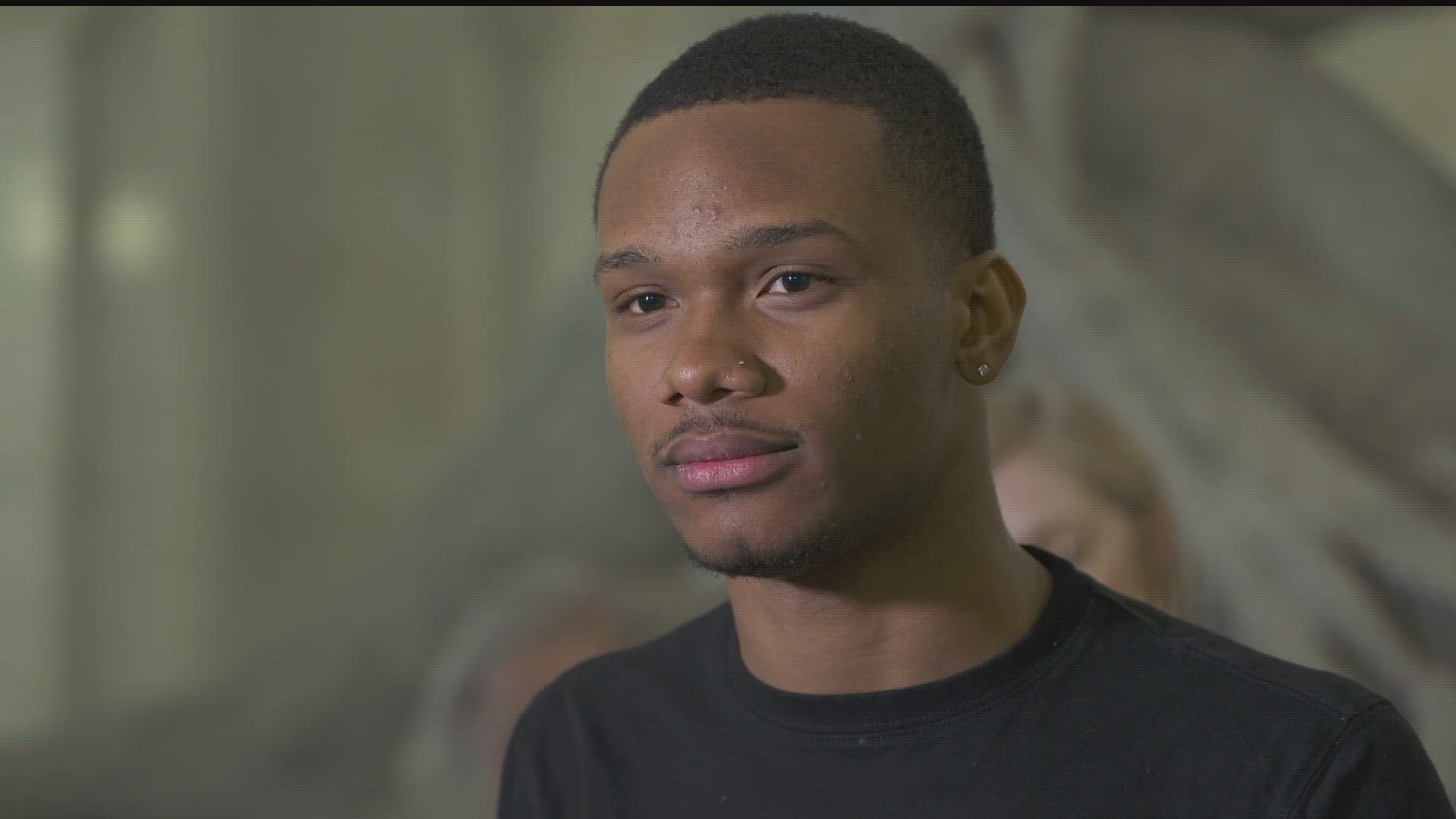MINNEAPOLIS — The Minneapolis Police Department engaged in patterns of excessive force and discrimination, according to findings of a 2-year Justice Department investigation.
At a press conference in Minneapolis Friday, U.S. Attorney General Merrick Garland said the DOJ investigation found Minneapolis police engaged "in a pattern or practice of using excessive force, unlawfully discriminating against Black and Native American people in enforcement activities, violating the rights of people engaged in protected speech, and discriminating against people with behavioral disabilities when responding to them in a crisis."
Garland said the conduct violates the First and Fourth Amendments to the United States Constitution, as well as the Civil Rights Act, Safe Streets Act, and the Americans with Disabilities Act.
The Justice Department is recommending a list of 28 changes for MPD. Garland said the Justice Department, the City of Minneapolis and the Minneapolis Police Department have agreed in principle to negotiate a consent decree, or legally-binding plan for reform.
The DOJ's investigation was announced in April 2021, one day after former Minneapolis officer Derek Chauvin was convicted of murder and manslaughter in the death of George Floyd.
"As I told George Floyd's family ... his death has had an irrevocable impact on the Minneapolis community, on the country and on the world," Garland said. "The patterns and practices we observed made what happened to George Floyd possible."
Watch the full DOJ news conference below:
The Findings
Garland detailed several examples of Minneapolis officers engaged in excessive force, or failing to intervene to stop other officers using excessive force, including multiple occasions involving then-officer Derek Chauvin prior to the murder of George Floyd.
"The Minneapolis Police Department routinely uses excessive force, often when no force is necessary, including unjust deadly force and unreasonable use of tasers," Garland said. "MPD officers discharge firearms at people without assessing whether the person presents any threat, let alone a threat that would justify deadly force."
The DOJ investigation also detailed numerous examples of discriminatory behavior by MPD officers, particularly following traffic stops.
"Based on our review of the data, MPD officers stop, search and use force against people who are Black and Native American at disproportionate rates," Garland said, noting they were stopped six times more often than white people without arrest or citations.
Garland also noted several occasions in which officers were not held accountable for racist conduct until public outcry drew attention to the situation.
"Such conduct is deeply disturbing and it erodes the community's trust in law enforcement," Garland said.
In addition, the DOJ investigation found Minneapolis officers violated free speech rights with retaliation against both demonstrators and journalists. Garland noted an incident during the unrest following George Floyd's murder, in which an MPD officer pushed a journalist's head to the ground and pepper sprayed him, despite clearly displaying press credentials.
A final section of the DOJ report detailed discriminatory conduct against people with behavioral health disabilities during calls for assistance.
"Only 0.45 percent of over 100,000 mental health calls resulted in an arrest at the scene. This underscores that the current reliance on police-only responses is unwarranted," said Assistant Attorney General Kristen Clarke, who said the DOJ recommends moving toward utilizing more behavioral health specialists.
Garland noted some "important changes" have already been implemented by the Minneapolis Police Department, including a ban on neck restraints and no-knock search warrants, but said more reforms are needed, leading to the DOJ's 28 recommendations.
The reaction
"Today it marks a new chapter in the history of public safety in the city of Minneapolis," Minneapolis Mayor Jacob Frey said at the press conference. "To take real action we first have to action where we've been, the pain we've caused, and to take a hard look at the specifics that need to be changed."
"We are going to use these findings to better policing in the city of Minneapolis," Frey vowed.
Current Minneapolis Police Chief Brian O'Hara, who was hired late last year due in part to his experience working through a federal consent decree in Newark, N.J., promised to be transparent in the reforms that lie ahead.
"We will change the narrative around policing in this city," O'Hara said. "Out of the darkness and trauma our residents and our police officers have experienced over the last three years, we will emerge as a beacon of light for the rest of the world. I have great faith in the resilience of the MPD and in the character of our community. As we move through this process together we will continue to heal and we will rebuild stronger. At the end of this process, our city will be safer, and the police and all communities of this city will be more united than ever before."
However, civil rights attorneys Ben Crump, Jeff Storms and Antonio Romanucci, who represent the families of George Floyd and Amir Locke, had a mixed reaction to the DOJ report, expressing doubts about the ability of MPD to change.
"We do believe this report and the action steps that should follow give hope that the federal government will compel the change that the City of Minneapolis and its police department has long failed to create from within," the attorneys said in a news release. "Unfortunately, our legal team remains skeptical about Minneapolis’ commitment to change and accountability. We are deeply concerned that while City leaders appear to be cooperating with the DOJ directives to create change, the City is doing the opposite, and vigorously defending the conduct of the officers who shot and killed Amir Locke, with the City's pending motion to dismiss the case against Officer Hanneman and the City of Minneapolis for the February 2022 shooting death of Amir during a no-knock raid."
Community leaders and activists held their own news conference after the DOJ report was released to call for ongoing accountability.
"It's really sad that it took a small group of dedicated citizens to call upon the Department of Justice to investigate the atrocious, horrific and brutal behavior of the Minneapolis Police Department," said civil rights attorney and Wayfinder Foundation Executive Director Nekima Levy Armstrong.
"By exposing the deeply-rooted issues in policing, this investigation provides an opportunity for meaningful reflection and a catalyst for comprehensive changes that prioritize accountability, community engagement and the eradication of racial bias in policing. It is imperative that we collectively address these injustices and work toward creating a more just and equitable society for all," CAIR-MN Executive Director Jaylani Hussein said in a statement.
Michelle Gross, head of Communities United Against Police Brutality (CUAPB), noted that community members were heavily involved in providing feedback, sending more than 2,300 comments and testimonies to the DOJ during the investigation.
"Overall we're pleased with the report, we think it's factual," said Michelle Gross of CUAPB. "This report is a robust report, it is well documented, it outlines the problems with the Minneapolis police, these problems have gone on for decades, this is not new ... it gives us an opportunity to address these problems in meaningful manners with the community at the table."
However, Gross said she and others are disappointed the DOJ report did not address MPD treatment of unsheltered and homeless people.
Watch the news conference from community groups reacting to the DOJ report below:
In addition to the federal investigation, the Minneapolis Department of Human Rights launched a separate state investigation into the Minneapolis Police Department, which led to a settlement approved by the Minneapolis City Council in March. That settlement called for limitations on the Minneapolis Police Department's use-of-force, and a focus on de-escalation; limitations on stops, searches and arrests; use requirements for body-worn cameras; reforms for police training; reviews and updating of MPD's policies; adopting non-discriminatory policing guidelines covering all protected classes; and support for officer wellness.
WATCH: The Minnesota Dept. of Human Rights details the results of its investigation into MPD in April 2022:
WATCH MORE ON KARE 11+
Download the free KARE 11+ app for Roku, Fire TV, Apple TV and other smart TV platforms to watch more from KARE 11 anytime! The KARE 11+ app includes live streams of all of KARE 11's newscasts. You'll also find on-demand replays of newscasts; the latest from KARE 11 Investigates, Breaking the News and the Land of 10,000 Stories; exclusive programs like Verify and HeartThreads; and Minnesota sports talk from our partners at Locked On Minnesota.
- Add KARE 11+ on Roku here or by searching for KARE 11 in the Roku Channel Store.
- Add KARE 11+ on Fire TV here or by searching for KARE 11 in the Amazon App Store.
- Learn more about the KARE 11+ app for Apple TV in the Apple App Store.
- Learn more about KARE 11+ here.


